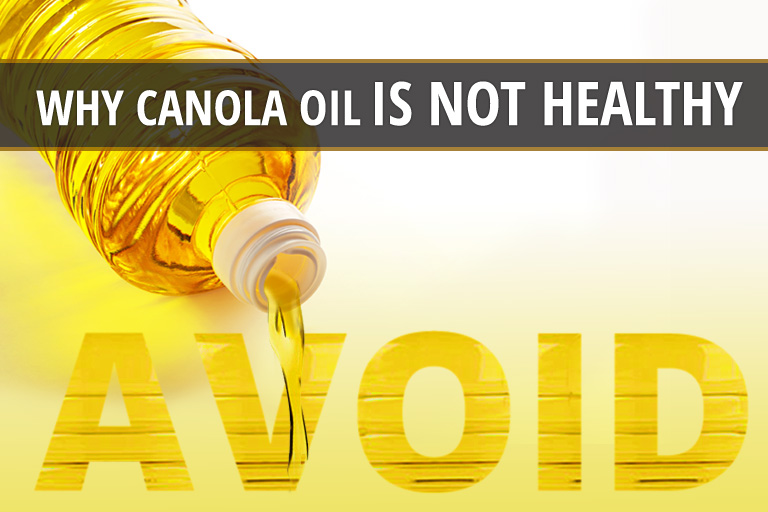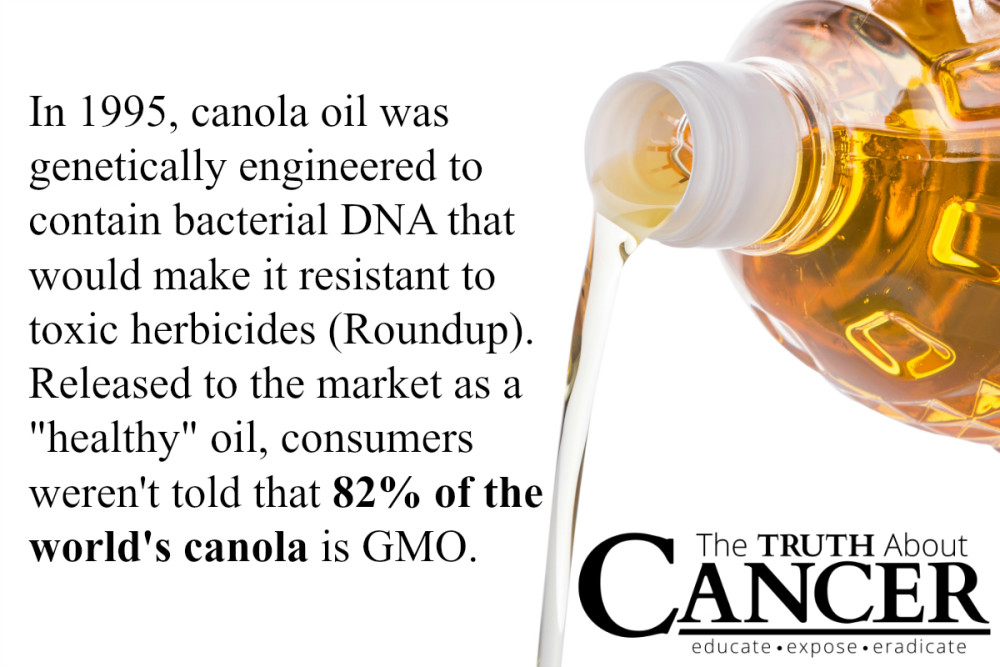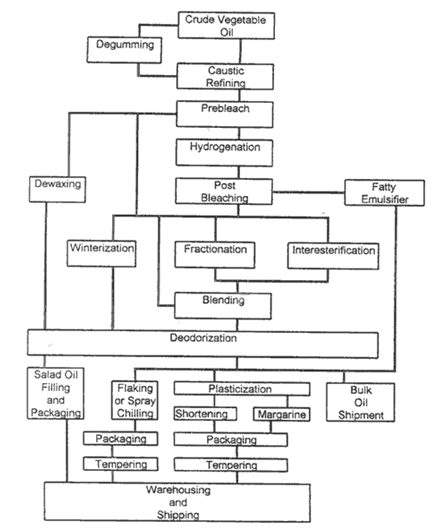Can a “health food” eaten by millions really be dangerous?
Canola oil and its derivative, rapeseed, are primary suspects for the exceptionally high incidence of Asian lung cancer.
According to mainstream media though, canola oil is “good for the heart” offering viable monounsaturated fats similar to olive oil. Sadly, much of what we hear in the mainstream media and various “health” blogs has been influenced by aggressive marketing tactics of big food companies.
For this reason, it is critical to know what websites to avoid and where you can go to get trustworthy and accurate health information.
In order to understand how canola oil came into the marketplace, some historical background is needed.
A Bit of History on Canola Oil
We can trace olive oil back to olives and sesame seed oil back to sesame seeds, so wouldn’t it make sense that canola oil would come from canola seeds? Well, it’s not the case. There is no natural canola plant that produces canola oil.
In the late 1960s canola oil was invented in Canada. The oil was cheap to manufacture and a dominant ingredient in many processed foods. A derivative of the rapeseed plant, which is part of the mustard family of plants, canola oil has been hybridized to eliminate the lethal erucic acid found in rapeseed.
Olive oil was the product of choice among those who were health conscious; however, it was quite expensive to mass produce. So the food industry, needing a more affordable substitute, started selling rapeseed oil. Unfortunately, the rapeseed oil caused muscular heart lesions.
The erucic acid found in rapeseed oil is naturally poisonous to the degree that insects avoid it. Rapeseed oil is also the source of the notorious chemical warfare agent, mustard gas. The US banned rapeseed in 1956 when thousands of soldiers and civilians experienced blistered lungs and skin. Rapeseed oil also lubricated steam engines and ships due to its unique ability to adhere to wet metal.
In 1964, the food industry collaborated with both the chemical and nuclear industries in an attempt to reduce the toxicity levels of rapeseed. It took the food industry over a decade and a tremendous amount of genetic engineering to get rapeseed oil to be acceptable to the US market.
The late 1970s introduced a technique of genetic treatment involving cracking open seeds. Canadian plant breeders developed a variation of rapeseed that produced a monounsaturated oil low in erucic acid.
The name was changed to LEAR: Low Eruric Acid Rapeseed. LEAR was not well received in the US as its association with rapeseed was too glaring. Not to mention having the word “rape” in a product name, which did not promote a healthy image.
In 1978 the food industry merged the words “Canada” and “ola” meaning oil – creating the name Canola Oil.
The Impact of Canola on the Food Industry
Prior to the late 1970s, the food oil industry collaborated with the American Heart Association, departments of nutrition at major universities and numerous government agencies to advocate polyunsaturated oils as being heart healthy. This was in contrast to the false hardening of the arteries effect of saturated fats.
However, by the late 1970s/early 80s, the cooking oil industry in North America had a huge dilemma. The consumption of polyunsaturated oils – corn and soybean oils in particular – were directly connected to numerous inflammatory health complications: namely cancer and heart disease.
Subsequently, as a result of this problem, the food industry had to discontinue using large volumes of polyunsaturated oils and no longer made claims of the oils being healthy.
Furthermore, manufacturers would not resume the use of traditional “healthy” saturated fats – butter, lard, tallow, palm oil and coconut oil mainly due to their narrow profit margins.
During the early 1980s canola oil began an initial marketing campaign in the United States. In order to receive a full green light to move forward, the oil needed GRAS (generally regarded as safe) approval from the US Food & Drug Administration (FDA).
GRAS rating awards typically go to food and herbal products with a history of no known adverse effects. However, canola oil was a new product that had no previous history (although it was associated with a banned product known for having lethal side effects). On the other hand, rapeseed oil was never granted GRAS approval.
A change in the regulation needed to take place before canola oil could be marketed in the US. We still do not know exactly what happened, but GRAS was granted to canola oil in 1985. The rumor mill churned such tales citing that the Canadian government, as a result, had a $50 million deficit in their coffers.
Originally canola oil was invented through basic laboratory breeding and selection techniques. Nevertheless, in 1995 a major alteration launched a canola that was genetically engineered to contain bacterial DNA that would make it resistant to toxic herbicides (Roundup).
Genetically modified crops are a combination of the DNA of two or more different species that cannot naturally reproduce together (like a chicken and a celery stalk). Such “frankenfood” could never occur in nature, even by random mutation. Today, most canola oil comes from genetically engineered seeds that are so far deviated from the natural rapeseed that it can be patented.
Around 82 percent of the world’s canola crops are currently genetically engineered to resist Roundup. Monsanto presently owns patents on the Roundup-Ready canola seed and farmers can be sued for not using the seed or having “unauthorized” canola plants in their fields.
It is also next to impossible for farmers (organic or otherwise) to battle the superweeds that are evolving in reaction to constant massive doses of Roundup.
The Effects of Canola Oil on the Body
Even though it may be true that canola oil is high in monounsaturates (canola oil ranges between 55 – 65 percent monounsaturated fat and between 28 – 35 percent polyunsaturated fat, with only a minimal amount of saturated fat), canola oil is still anything but healthy.
The polyunsaturated component of canola is cause for major concern. The oil is extremely unstable under heat, light and pressure, which causes oxidation and releases free radicals inside the body.
Canola oil produces high levels of butadiene, benzene, acrolein, formaldehyde and other related compounds when heated, which become infused with the cooked food. All traces of omega-3 fats are essentially gone.
Moreover, in the chart below you’ll see that canola oil undergoes a heavy duty manufacturing process of abrasive refining, degumming, bleaching, and deodorization, using high heat and questionable chemicals before the final product is created.
A study released in 1996 by Japanese scientists showed that a special canola oil diet killed laboratory animals. Reacting to the unpublished, but verified and alarming information, the study was repeated by Canadian scientists this time using piglets and replacing milk with canola oil. In 1997, Nutrition Research published the second study results, where researchers verified that canola oil drained vitamin E from the piglets to hazardously low levels.
Vitamin E must be in the body when eating processed fats because it controls the oxidative degeneration of lipids and blocks free radicals from invading the cell membranes.
To Sum it All Up
If you have watched any of The Quest For The Cures docu-series, one thing I hope you learned is that you want to eat foods as close to nature as possible. The caustic manufacturing process of canola should alone be enough to cause you to avoid this toxic oil.
In addition, canola oil inflames your body with foreign, genetically engineered DNA, trans fats, and toxic chemical residues. It is also a plague on the environment and a threat to organic farming and should be avoided.
Recommendations for Healthier Fats and Oils:
- Extra virgin olive oil that is cold pressed – conducts best under lower cooking temperatures.
- Virgin coconut oil – cooks well under a wide range of temperatures. Offers an abundance of healthy saturated fats in the form of medium chain triglycerides (MCT), one being lauric acid which helps support the immune system.
- Organic grass-fed butter or ghee – a great source of Conjugated Linoleic Acid (CLA) which has shown in studies to help prevent cancer, build muscle and burn fat. Both ghee and butter are very stable under high temperatures as well.
If you haven’t noticed already, you will see that canola oil is used in almost all prepared foods at health food stores. Please speak out to the owners, when possible, to see if they will switch to a healthier oil or use no oil at all. Most importantly, please share this critical information with friends and family.





















What about Peanut Oil
Besides using olive oil. I use grape seed oil and sunflower oil, I hope those are good
Please read Dr. Esselstyn’s “How to Prevent and Reverse Heart Disease, a scientifically based cure” and see why he recommends no oil, not even one spoonful, and read why all of his patients are curing themselves of heart disease. Look at the arteries clearing up, opening up, as the fiber and alkaline foods dissolve the oily residue in their inner pipes and tubes. That’s not to say that the good natural oils in foods like 2 oz. of avocado, or a handful of soaked walnuts (or, better, soaked and drained walnuts blended with fresh baby greens, sea vegetables like dulse, and vegetables like onions and garlic into a pate or gluten-free sandwich spread or wrapped in a romain lettuce leaf)
Wow thanks
I have noticed canola oil as an ingredient in many products at stores that are supposed to be healthy. Some will say organic canola oil. Do you know how that is produced and processed?
I just can’t see that organic canola oil can be bad, when it’s not GMO. Anybody?
While the author made much of canola being genetically modified to resist Roundup, I think it’s interesting that as a source for information on cancer, there doesn’t seem to be much enthusiasm for reminding folks that all the meat, dairy and eggs they are eating are coming from animals that are fed massive amounts of GMO soy and corn. Where exactly do people think the Roundup in breast milk is coming from?
Maybe spend less time worrying about ‘Organic’ Canola and more time worrying about all the life-impacting animal products that are being overeaten on a daily basis by the vast majority of people.
Thanks for sharing your thoughts with us Debrah. We are glad you are here with us.
what about expeller pressed canola oil?
Hi what you think about grapeseed oil?
I feel healthier when use compare to other oils or can it be my brain tricking me?
Hi Junior –
We don’t have any articles on grape seed oil just yet, but perhaps this article can be helpful to you:
https://thetruthaboutcancer.com/health-benefits-of-grape/
Hope this helps. Blessings and love!
It is said that canola oil causes cancer because it continues to be extracted with hexane. This is absolutely not true. I would let the facts speak for themselves, and these facts can easily be verified in a credible oil laboratory.
Oils are in seeds, and in nuts. Some tree bark, rhizomes, and leaves do also have oil. However, to extract oils on a large scale without losing their intrinsic properties, hexane must be used. Why hexane?
Hexane (C6 H14) is a multipurpose compound that extracts oil under controlled temperature and pressure, and also, serves as a high-velocity solvent and cleaner. These are three sterling qualities for the price of one.
It is because hexane performs three highly-demanding functions simultaneously that it reduces the oil extraction cost by millions of dollars, thereby allowing some of the savings to be immediately passed on to the consumer. This explains why high-value oils such as canola oil, safflower oil, etc. are affordable.
The oils or products that oil companies are using hexane to extract are:
Soy
Corn
Canola
Safflower
Sunflower
Cotton
Flax, and
Shea butter.
The cancer controversy
Let me take a moment to share the scientific facts that you may not be aware of. Smog is a big concern and it is not hexane that causes it. It is rather the distilleries, the car manufacturers, the gas-extracting companies, the wood burners, tire burners, forest fires, the diesel fuel burners, etc. that spew the following into the atmosphere:
Sulfuric acid
Aluminum nitride
Aluminum sulfide
Aluminum halides
Sulfur dioxide
Nitrogen dioxide
Silicon dioxide
Sulfur trioxide
Nitrous oxide
Methane
Hydrofluorocarbons and dozens more
Carbon dioxide and nitrogen already abound in the atmosphere, but when all these atmospheric pollutants from human and industrial activities combine with carbon dioxide and nitrogen, they cause smog.
It is the smog that damages the ozone to allow the UV rays to cause skin cancer in individuals who do not have HDL in their skin. Compared to over 300 atmospheric pollutants from diesel fuel burners, gas extractors, etc. hexane is infinitesimal. The ozone was already damaged, and hexane played no part in this damage.
The EPA (Environmental Protection Agency) investigated the claims that hexane causes cancer, and it found no shred of truth in this bogus claim. This was why EPA allowed the users of hexane to continue to use it to extract shea butter and many vegetable oils. The EPA closed its hexane studies years ago. Unfortunately, the EPA’s conclusions and recommendations were not made public. This is why ignorant and uninformed individuals continue to beat their drums on the Internet.
Let me at this point share what was never shared with the public, and this is unfair.
The reason hexane is excellent for extracting oil is, 1) it recovers all the fatty acids in oil easily and faster 2) it has a low boiling point (63 – 69 degrees C or 153 degrees F – 156. 2 degrees F) compared to the other vegetable oils 3) its solubilizing property is excellent. As a result, it makes the extracted oil produce fewer lipid peroxides when heated and 4) it also allows the extracted oils to retain their therapeutic properties, especially canola oil.
The boiling point of water is 212 degrees Fahrenheit. This is far higher than the hexane-extracting temperature. The boiling point of crude oil is in excess of 1000 degrees Fahrenheit and the boiling point of soybean oil is 572 degrees Fahrenheit. If Symptometry does not recommend soy oil, it is because its boiling point makes the person who eats food that was cooked or fried in soy oil more susceptible to lipid peroxidation.
Additionally, canola oil has only 7% saturated fat compared to olive oil which has 80% saturated fat. Do you want to know why olive oil predisposes a person to stroke? You need not look any further. You now have the facts. It causes too much lipid peroxidation.
It was the politics of vegetable oil in the 1960s that projected olive oil in a more favorable light and demonized canola oil. It is all about unfair business practices. Nothing else.
Yes, it is true that canola oil is a hybrid oil (rapeseed and mustard seed), but it is equally true that it has only 7% of saturated fat, compared to olive oil, natural oil, which has 80% of saturated fat. Also, canola oil causes less lipid peroxidation.
Natural does not necessarily mean the product is healthy, safe, or cell friendly. There are boobytraps in many natural products. Therefore, buyers beware, and users be alert.
Canola oil has received bad press for decades, and this is not fair, especially when the facts are on its side. I am a Symptometry researcher looking for the total truth wherever I can find it.
The canola oil corporation does not know me, and I do not know the barons of canola oil. I am just sick and tired of seeing an excellent oil being knocked down and pummeled left and right, especially, by people who have absolutely no research credibility.
Let us go to the lab. The machines do not know me as a White man, Black man, short man, or tall man. Just throw the different oils into the machine, one oil at a time, and wait for the analysis. This is what makes chromatography an excellent independent arbiter that allows truth to prevail.
“Bob” says,
“The EPA investigated the claims that hexane causes cancer, and it found no shred of truth in this bogus claim. This was why EPA allowed the users of hexane to continue to use it to extract shea butter and many vegetable oils. The EPA closed its hexane studies years ago. Unfortunately, the EPA’s conclusions and recommendations were not made public. This is why ignorant and uninformed individuals continue to beat their drums on the Internet.”
Sorry, but only someone from Big Food and Big Pharma-Medical Industrial Complex would make such ludicrous and self-serving arguments.
,
So typical for these special kind of shills, that never back up their claims with hard data.
Because why?
“…the EPA’s conclusions and recommendations were not made public.”
Quite convenient.
Here is hard data that is indisputable:
EPA exposed for hiding chemical risks, favoring corporate interests
https://usrtk.org/pesticides/epa-exposed-for-hiding-chemical-risks-favoring-corporate-interests/